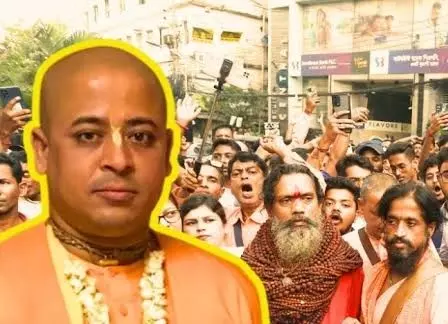
- Home
- India
- World
- Premium
- THE FEDERAL SPECIAL
- Analysis
- States
- Perspective
- Videos
- Sports
- Education
- Entertainment
- Elections
- Features
- Health
- Business
- Series
- In memoriam: Sheikh Mujibur Rahman
- Bishnoi's Men
- NEET TANGLE
- Economy Series
- Earth Day
- Kashmir’s Frozen Turbulence
- India@75
- The legend of Ramjanmabhoomi
- Liberalisation@30
- How to tame a dragon
- Celebrating biodiversity
- Farm Matters
- 50 days of solitude
- Bringing Migrants Home
- Budget 2020
- Jharkhand Votes
- The Federal Investigates
- The Federal Impact
- Vanishing Sand
- Gandhi @ 150
- Andhra Today
- Field report
- Operation Gulmarg
- Pandemic @1 Mn in India
- The Federal Year-End
- The Zero Year
- Science
- Brand studio
- Newsletter
- Elections 2024
- Events
- Home
- IndiaIndia
- World
- Analysis
- StatesStates
- PerspectivePerspective
- VideosVideos
- Sports
- Education
- Entertainment
- ElectionsElections
- Features
- Health
- BusinessBusiness
- Premium
- Loading...
Premium - Events

The Yunus government has been rattled by a report of a British all-party parliamentary forum which raised questions on the efficacy of the interim regime
The interim government in Bangladesh headed by Nobel laureate Muhammad Yunus has played a trump card which unpopular leaders in the country have used earlier — communal polarisation.
The arrest of ISKCON leader Chinmoy Krishna Das Prabhu on charges of sedition, and the denial of bail, was designed to provoke Hindus who have been facing a rising spate of atrocities since the ouster of the Sheikh Hasina government on August 5.
Such attacks have happened in Bangladesh in the past but the Hindus in that country have rarely responded with the kind of massive street protests as it has been happening since August.
Why arrest a Hindu leader?
Realising that Chinmoy Prabhu played a key role in mobilizing and organising Hindus across major cities, the Yunus administration knew that his arrest would trigger more protests by angry Hindus.
Also read: Bangladesh: HC refuses to ban ISKCON after govt updates it about steps taken
In a country where Muslims are an overwhelming majority of nearly 93 per cent, visible Hindu protests with swelling crowds have the potential to trigger a possible backlash in the present climate of free-for-all dominated by Islamist radicals operating behind the facade of student-youth groups.
So, what better than to provoke a surge of communal passion when a government needs to divert attention from its obvious failures such as inability to control rising prices of essential commodities or to check a sharp decline in law and order?
Attempt to divert focus
The Hindu protests following the arrest of Chinmoy Prabhu and the murder of a Muslim lawyer in Chittagong in mysterious circumstances has served the immediate purpose of the Yunus government.
Suddenly, all focus in Bangladesh is on ISKCON, with which Chinmoy Prabhu has had a long association, and the surcharged communal exchanges, aggravated by social media posts. These have taken the attention away from a tottering economy.
Court petitions to ban the ISKCON and the government's plans to prosecute Chinmoy Prabhu will help keep other news off the headlines.
Also read: ISKCON asks Bangladesh government to protect Hindus
Attacks on secular ethos
As communal passions rise, the already shrinking secular political space will marginalise Bengali nationalist forces and thus help the Islamist parties consolidate their new-found gains.
These parties have already got the Yunus government to undermine the legacy of the 1971 Bangladesh liberation war by playing down its linguistic-secular ethos. The Liberation War Museum has been vandalised and crucial historical documents destroyed.
These radical elements who surround Yunus and front him to manage the West have also calculated the "India factor" while ordering the arrest of the monk.
Taking on India
They knew that Chinmoy Prabhu's arrest would provoke angry reactions from India, especially the Hindutva forces.
Indeed, the strong reaction to the arrest by the Indian external affairs ministry was anticipated by the Yunus government because the Modi government has been strongly raising the issue of minority persecution with Dhaka.
The strong riposte from the Yunus government to the Indian statement points to a calculated effort to whip up anti-India feelings by pandering to the stereotype of covert Indian efforts to undermine the administration by orchestrating Hindu protests.
Also read: Bangladesh: 30 held over killing of lawyer in clash between police, followers of jailed Hindu leader
Awami League factor
But why does this narrative have takers in Bangladesh — which is incidentally what Yunus and his advisors want?
That is because India continues to shelter Sheikh Hasina and many of her close lieutenants, including some former ministers and Awami League bosses. When Yunus or anyone in his government talks of "vested interests" vis-a-vis the minority protests, they clearly have the Awami League in mind.
In the past three months, the Awami League has been down and out, at the receiving end of a brutal vendetta campaign. But despite largescale arrests and a plethora of cases on less-than-credible charges, some veteran leaders have tried to rally supporters at the grassroots on occasions such as August 15, the day when Bangladesh's founding father Sheikh Mujibur Rahman was assassinated with almost his entire family in 1975.
Brute force versus democracy
But such attempts have been thwarted by brute force by the student-youth groups that led the mass upsurge against the Hasina government. These groups have received strong backing from the Islamist parties and their fanatic cadres.
The police, badly demoralised after huge casualties following Hasina's ouster, have often stood by as silent spectators. So has the army, on most occasions.
Yunus and his cohorts suspect that the Awami League cadres, unable to rally under their own party banner, may be joining the Hindu protest rallies in large numbers in an attempt to discredit his government on the issue of minority persecution.
Also read: As mobocracy rules Bangladesh, law and order, human rights take a hit
Pandering to communal forces
When this is contextualised with the interim administration's special favours to Islamist radicals, including the release of convicted terrorists such as Andarullah Bangla Team chief Jashimuddin Rahmani, the real colours of the Yunus regime stand exposed.
Yunus can dismiss Indian reactions as exaggerated and unfounded but when US president-elect Donald Trump fires missives on minority persecution in Bangladesh or his South Asia advisor Lisa Curtis points to rising Islamic terrorism in the country, the Nobel laureate has to take them seriously. Because, his regime, which lacks a firm constitutional basis, can only survive with Western, specially US, support.
British concerns on Bangladesh
The Yunus government has been rattled by a report of a British all-party parliamentary forum which has raised questions about the efficacy of the new interim regime.
"There is an urgent need to end the culture of using the law as a political weapon, and that human rights and the rule of law need to be upheld. A failure to do this will not reflect well on the new interim regime of Professor Muhammad Yunus," the report said.
It added: "We have received evidence that murder charges are being slapped on former ministers, Awami League leaders, MPs, former judges, scholars, lawyers and on journalists in such numbers to raise questions around their credibility."
Also read: Bangladesh may seek Hasina’s trial in International Criminal Court: Report
Address minority persecution
The report observed that largescale murder charges against all those seen as opponents of the government were "a dangerous new trend".
So, although the arrest of the ISKCON leader may help the Yunus government divert hostile public opinion by communal polarisation and anti-India rhetoric, it will come under a cloud if it fails to address the issue of minority persecution and restoration of democracy.
Or else, the very issues on which Hasina was hauled up will come to haunt Yunus in no uncertain terms.
(The Federal seeks to present views and opinions from all sides of the spectrum. The information, ideas or opinions in the articles are of the author and do not necessarily reflect the views of The Federal)


